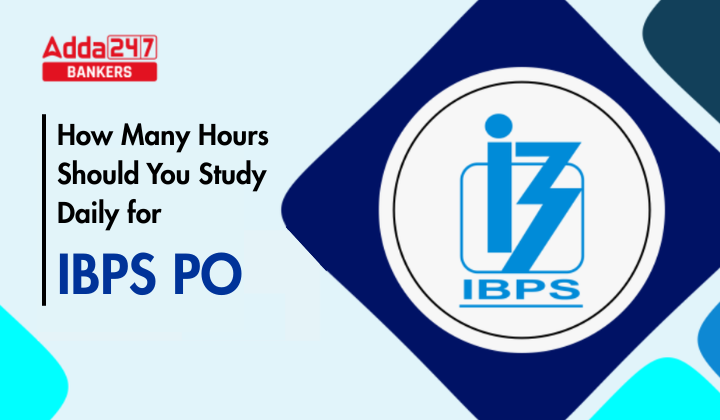The number of hours you should study daily for the IBPS PO exam can vary depending on your current knowledge, grasping power, and the time you have before the exam. However, most experts suggest a range of 6-8 hours of focused study daily for effective preparation. Some candidates might even crack it with 4-5 hours a day if they are highly consistent and efficient. Here is the method that How Many Hours you should study daily for IBPS PO?
How Many Hours Should You Study Daily for IBPS PO?
The IBPS PO Exam preparation requires a well-structured and strategic approach due to its competitive nature and comprehensive syllabus. Whether you are just starting out or want to boost your preparation, this plan is designed to help you manage your time, stay focused, and develop the skills needed to clear both the preliminary and main stages of the IBPS PO exam. Here’s a breakdown of why this range is suggested and a complete study plan:
Why 6-8 Hours Study?
- Detailed Syllabus: The IBPS PO exam has a vast syllabus covering Reasoning, Quantitative Aptitude, English Language, General/Economy/Banking Awareness, and Computer Aptitude (for Mains).
- High Competition: With lakhs of aspirants applying for a limited number of vacancies, thorough preparation is crucial.
- Speed and Accuracy: The exam is time-bound, requiring both speed and accuracy. Consistent practice for several hours helps build these skills.
- Mains Preparation: Many topics for Mains overlap with Prelims, so starting early with a good study schedule ensures you’re prepared for both.
Key Principles for Effective Study:
- Quality over Quantity: Focused study for 4-5 hours is more effective than distracted study for 10-12 hours.
- Consistency is Key: A steady and disciplined routine is more beneficial than sporadic cramming.
- Balance All Sections: Don’t neglect any section, as there are sectional as well as overall cut-offs.
- Mock Tests & Analysis: Regularly taking mock tests and thoroughly analyzing your performance is non-negotiable.
- Revision: Consistent revision of concepts, formulas, and current affairs is crucial for retention.
Complete Study Plan
The following study plan serves as a sample framework to help you organize your daily preparation. It is structured to cover all key subjects of the IBPS PO exam, including Reasoning, Quantitative Aptitude, English, General Awareness, and Computer Aptitude. Use this plan as a base to ensure balanced coverage, efficient time management, and consistent progress toward your goal.
I. Daily Study Routine
Here’s a sample daily timetable designed for full-time aspirants targeting 6–8 hours of focused study, ensuring balanced coverage of all sections.
- Morning (2-3 hours):
- 6:30 AM – 7:00 AM: Wake up, light exercise/stretching, get fresh.
- 7:00 AM – 8:00 AM: Start your day by reading the newspaper, focusing on the editorial and business pages, and make brief notes on important current affairs.
- 8:00 AM – 9:00 AM: Quantitative Aptitude – Focus on concepts and practice questions (e.g., Simplification, Approximation, Number Series, Quadratic Equations, or a specific arithmetic topic).
- Late Morning/Early Afternoon (2-2.5 hours):
- 9:00 AM – 10:00 AM: Reasoning Ability – Focus on puzzles and seating arrangements.
- 10:00 AM – 10:30 AM: Short break.
- 10:30 AM – 11:30 AM: English Language – Grammar rules, Reading Comprehension practice.
- 11:30 AM – 12:30 PM: General Awareness/Banking Awareness/Static GK.
- Afternoon/Evening (2.5-3 hours):
- 12:30 PM – 1:30 PM: Lunch and rest.
- 1:30 PM – 2:30 PM: Practice sectional mock tests (e.g., one section of Quant or Reasoning).
- 2:30 PM – 3:00 PM: Analyze mock test, identify mistakes, and note down weak areas.
- 3:00 PM – 4:00 PM: Revision of weak topics or a specific Mains-level topic (e.g., Data Analysis & Interpretation, advanced puzzles, or ESI/FM basics for Phase 2).
- 4:00 PM – 5:00 PM: Revision of previous day’s topics, formulas, or short notes.
II. Section-wise Focus:
- Quantitative Aptitude:
- Focus: Speed, accuracy, arithmetic, Data Interpretation (DI).
- Daily Goals: Solve 25-30 questions, including 2-3 DI sets. Practice calculation techniques (speed math, Vedic math).
- Reasoning Ability:
- Focus: Puzzles, seating arrangements, input-output, syllogism, inequalities.
Daily Goals: Solve 25-30 questions, including 5-7 puzzles/seating arrangements.
- Focus: Puzzles, seating arrangements, input-output, syllogism, inequalities.
- English Language:
- Focus: Grammar rules, Reading Comprehension (RC), Cloze Test, Para Jumbles, Vocabulary.
- Daily Goals: Read and summarize 1 editorial. Learn 10 new English words with usage. Practice grammar rules and error spotting.
- General/Economy/Banking Awareness:
- Focus: Current affairs (last 6-8 months), static GK related to banking and finance, banking terms.
- Daily Goals: Revise 2-3 government schemes/important banking terms. Stay updated with daily news.
- Computer Aptitude (Mains):
- Focus: Basic computer knowledge, MS Office, internet, networking, shortcuts.
- Daily Goals: Dedicate specific time for this if you’re weak, or integrate it with other subjects.
III. Weekly & Weekend Routine:
- Weekdays: Follow the daily study plan.
- Weekends:
- Full-length Mock Test: Take at least one full-length mock test (Prelims initially, then Mains as you progress).
- Mock Test Analysis: Dedicate significant time to analyze your performance in the mock test. Understand why you made mistakes (conceptual error, time management, silly mistake) and work on improving those areas.
- Revision: Comprehensive revision of all topics covered during the week.
- Descriptive Writing (for Mains): Practice 1-2 descriptive writing questions (essay and letter).
- General Awareness Quizzes: Attempt quizzes on current affairs and static GK.
IV. Phased Preparation Strategy:
- Phase 1: Concept Building (Initial 1-2 months):
- Focus on understanding the basic concepts of all subjects.
- Go through the syllabus thoroughly.
- Use reliable study materials (books, online courses).
- Practice topic-wise questions to build a strong foundation.
- Phase 2: Full Syllabus Coverage & Practice (Next 2-3 months):
- Cover all topics as per the Prelims and Mains syllabus.
- Prioritize high-scoring areas.
- Start attempting sectional tests to improve accuracy and speed.
- Begin practicing descriptive writing for Mains.
- Phase 3: Revision & Mock Tests (Last 1-2 months before Prelims):
- Intensive revision of all covered topics.
- Focus heavily on full-length mock tests for Prelims.
- Analyze mock tests meticulously to identify weak areas.
- Refine time management strategies.
- Phase 4: Mains Specific Preparation (After Prelims, till Mains):
- Shift focus to Mains-level topics (advanced DI, complex puzzles, comprehensive GA, Computer Aptitude).
- Increase the frequency of full-length Mains mock tests.
- Intensive practice of descriptive writing.
- Thorough revision of current affairs (last 6-8 months).
| Related Post | |
| IBPS PO Exam Date 2025 | IBPS PO Salary |
| IBPS PO Previous Year Papers | IBPS PO Syllabus |
| IBPS PO Mock Test | IBPS PO Eligibility |




 RBI Assistant Vacancy 2026 Out, Check Ca...
RBI Assistant Vacancy 2026 Out, Check Ca...
 New Changes Introduced for RBI Assistant...
New Changes Introduced for RBI Assistant...
 Bank of Baroda Peon Admit Card 2026 Out,...
Bank of Baroda Peon Admit Card 2026 Out,...








